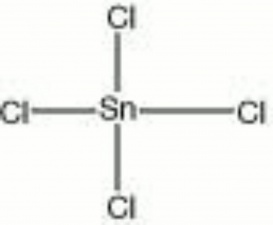Difference between revisions of "Stannic chloride"
Jump to navigation
Jump to search
m (Text replace - "== Authority ==" to "== Sources Checked for Data in Record ==") |
m (Text replace - "\[http:\/\/cameo\.mfa\.org\/materials\/fullrecord\.asp\?name=([^\s]+)\s(.*)\]" to "$2") |
||
| Line 1: | Line 1: | ||
== Description == | == Description == | ||
| − | White to light yellow, fuming liquid. Stannic chloride absorbs [ | + | White to light yellow, fuming liquid. Stannic chloride absorbs [[water|water]] to form a white solid. Stannic chloride is used to weight [[silk|silk]] and as a [[mordant|mordant]] in dyeing [[textile|textiles]]. It is also used in the manufacture of [[blueprint%20paper|blueprint paper]] and other sensitized papers. Stannic chloride is used in coatings too increase electrical [[conductivity|conductivity]], [[reflected%20light|light reflectivity]], and [[abrasion%20resistance|abrasion resistance]]. |
== Synonyms and Related Terms == | == Synonyms and Related Terms == | ||
Revision as of 11:32, 10 May 2016
Description
White to light yellow, fuming liquid. Stannic chloride absorbs Water to form a white solid. Stannic chloride is used to weight Silk and as a Mordant in dyeing textiles. It is also used in the manufacture of Blueprint paper and other sensitized papers. Stannic chloride is used in coatings too increase electrical Conductivity, light reflectivity, and Abrasion resistance.
Synonyms and Related Terms
tetrachlorostannane; tin (IV) chloride; tin chloride; tin tetrachloride; tin perchloride; fuming spirit of Labavius; killed spirits
Other Properties
Soluble in water, ethanol, carbon disulfide. Decomposes in hot water.
| Composition | SnCl4 |
|---|---|
| CAS | 7646-78-8 (anhydrous) |
| Melting Point | -33 |
| Density | 2.2788 |
| Molecular Weight | mol. wt. = 350.61 |
| Boiling Point | 114 |
Hazards and Safety
Evolves heat on contact with moisture. Skin contact causes burns.
Mallinckrodt Baker: MSDS
Sources Checked for Data in Record
- G.S.Brady, Materials Handbook, McGraw-Hill Book Co., New York, 1971 Comment: p. 730
- Richard S. Lewis, Hawley's Condensed Chemical Dictionary, Van Nostrand Reinhold, New York, 10th ed., 1993
- Susan E. Schur, Conservation Terminology: A review of Past & Current Nomenclature of Materials, Technology and Conservation, Spring (p.34-39); Summer (p.35-38); Fall (p.25-36), 1985
- Random House, Webster's Encyclopedic Unabridged Dictionary of the English Language, Grammercy Book, New York, 1997
- The Merck Index, Martha Windholz (ed.), Merck Research Labs, Rahway NJ, 10th edition, 1983 Comment: entry 8929
- The American Heritage Dictionary or Encarta, via Microsoft Bookshelf 98, Microsoft Corp., 1998
